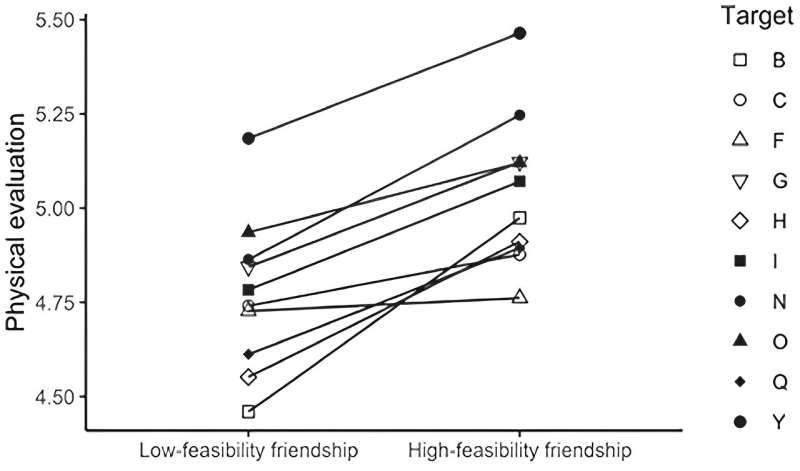This article has been reviewed according to Science X's editorial process and policies. Editors have highlighted the following attributes while ensuring the content's credibility:
fact-checked
peer-reviewed publication
trusted source
proofread
The anticipation of a social encounter encourages us to attribute more positive physical features to strangers

A new Tel Aviv University study reveals an intriguing phenomenon for the first time: the anticipation of social interactions and the desire to cultivate strong friendships with people in our midst can sometimes subconsciously lead us to attribute positive physical traits, even to complete strangers we have never encountered before.
In the study, the research team presented the participants with pictures of strangers and asked them to rate them according to various parameters. The unexpected revelations clearly showed that when the subjects were told of their imminent interaction and potential connection with these strangers, the majority exhibited a tendency to attribute more attractive appearances, pleasant scents, and agreeable voices to these individuals.
The research was led by doctoral student Natalia Kononov and Prof. Danit Ein-Gar of Tel Aviv University's Coller School of Management. The study was published in the journal Personality and Social Psychology Bulletin.
Prof. Ein-Gar explains that, as many studies have shown in the past, humans have an inherent aspiration to be in a socially and physically gratifying environment. Therefore, we sometimes tend to subjectively interpret reality to align with our desire for a pleasant sensory experience. In the present study, the researchers sought to examine how our preference for spending time in pleasant surroundings may also affect our perception of the "other," even though we have never met him or her.
"The findings showed that in many cases, our innate desire to immerse ourselves in a physically pleasing environment leads us to overestimate even unfamiliar individuals we anticipate interacting with in the future," notes Prof. Ein-Gar. "We tend to pre-label those strangers as better-looking and more appealing in the way they sound and smell, despite the fact that we never met them. Our judgments are formed solely on the basis of a photograph, which does not contain information about the person's scent or the sound of their voice."
The study included a series of online questionnaires, with approximately 5,000 respondents from the United States taking part. The researchers divided the participants into two groups and presented them with photos of individuals they had never met before. The first group was asked to first imagine that they had a very successful initial encounter with the stranger in the picture, and that they would like to cultivate a friendly relationship with them.
Only then were they asked to rate the features of the individual shown in the photo. In contrast, the control group rated the person photographed based only on their impressions of the photo, without any assumptions regarding a positive initial meeting or the intent to establish a relationship.
In another case, all study participants were informed of their desire to establish a friendship with a stranger they had just met at work. However, one group was informed that this individual had been assigned to their local branch, implying frequent encounters at work, while the control group was informed that the stranger was assigned to a distant branch, so they would not have the opportunity to spend time together.
In both cases, the findings showed that the subjects tended to overestimate and attribute better physical attributes to these strangers with whom they were going to be spending a significant portion of their time. In order to neutralize other biases, the researchers conducted the experiment using images of men and women from diverse ethnic backgrounds. This measure substantiated that the effect was not influenced by gender, sexual attraction, or specific appearance traits, but by our desire for a positive sensory experience.
Prof. Ein-Gar: "When we spend a lot of time in the presence of another person, there is naturally a habituation effect; for example, we 'don't see' the receding hairline or pimples, or we become accustomed to a squeaky voice. In this study, we reveal something different."
"We demonstrate that even in the absence of face-to-face interaction, and with no prior physical encounters, we tend to project a more positive evaluation on an individual we expect to spend time with—we anticipate that they will look, sound, and even smell good. When we expect to have shared experiences with someone, our inclination is to ensure a pleasurable sensory encounter. That's why we preemptively attribute positive physical attributes to the person."
Natalia Kononov, whose doctoral thesis encompassed this study, emphasizes that this phenomenon does not stem from perceiving someone positively simply because we like them. Instead, it emerges from an underlying motivation, which is not necessarily conscious, to create a pleasant reality for ourselves. After all, it is possible to love a person and still see all their flaws.
"When we anticipate spending time with someone, there's a subconscious incentive for that person to be physically pleasing. Therefore, we tend to evaluate them in a way that is consistent with our desires. This can be likened to the anticipation of taking a long-distance trip."
"If I really want to visit Hawaii, I will convince myself that it's easy for me to get there, as opposed to a situation in which I don't really want to go to Hawaii. The same principle applies to interactions with strangers: we convince ourselves that it will be pleasant to be around them if our motivation is to become friends."
More information: Natalia Kononov et al, Beautiful Strangers: Physical Evaluation of Strangers Is Influenced by Friendship Expectation, Personality and Social Psychology Bulletin (2023). DOI: 10.1177/01461672231180150


















